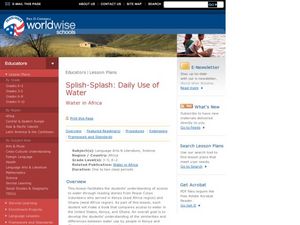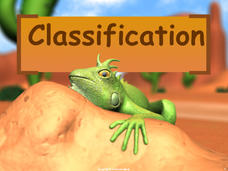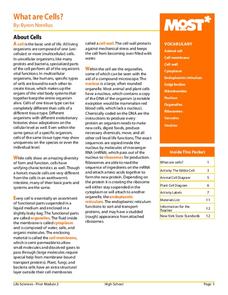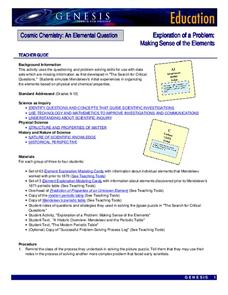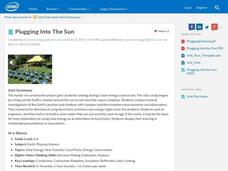Curated OER
Uses of Coal
An interesting series of puzzles and word games are available in this multi-page collection, which focuses on coal. Learners practice math and language arts skills as they solve the puzzles, and learn many facts about coal at the same time.
Cornell University
Too Much of a Good Thing?
Continuing their study of beneficial insects, young entomologists discover where in the world some of these bugs are. By labeling, coloring, and using the scale on a map, pupils explore the territories and arrival of the Asian lady...
Serendip
How Do Biological Organisms Use Energy?
When an organism eats, how does food become energy? Young biologists follow glucose through the process of cellular respiration to the creation of ADP using a discussion-based activity. The resource also highlights conservation of mass...
Howard Hughes Medical Institute
How the Body Uses Fat
Not all fat is bad—eating good fats actually helps with weight loss. Learn how the body uses fat through a 27-slide presentation that breaks down the path fat takes from entering to exiting the body. Understanding why fat is helpful and...
Curated OER
Splish-Splash: Daily Use of Water
Young scholars explore the daily use of water in Kenya and Ghana. In this Peace Corps lesson, students compare similarities and differences between water use by people in Kenya and Ghana and their own communities as they create books...
Biology Junction
Classification of Life
Did you know scientists identify more than 13 billion species of organisms, and they discover more almost every day? An interesting presentation demonstrates how scientists keep track of so many species. It also shows how they...
Intel
Forensics: Get a Clue
Although the methods are all scientific, forensic science was started by police officers rather than scientists, who relied on observation and common sense. Young detectives use many tools to solve crimes around the school in a...
PHET
Forces in 1 Dimension
A realistic simulation uses charts to show forces, position, velocity, and acceleration versus time based on how the simulation is set up. Once those concepts are mastered, scholars use free body diagrams to explain how each graph...
Urbana School District
Optics
Don't worry, optics is a light topic! The presentation covers reflection, refraction, fiber optics, mirages, prisms, rainbows, dispersion, mirrors, lenses, telescopes, diffraction, the human eye, and much, much more. Presentation is the...
Curated OER
What Are Cells?
Energize the cells of young biologists with an edible life science activity. Engaging students in exploring the inner workings of plant and animal cells, this activity involves using colored jello and various sweet and tasty treats to...
NASA
Exploration of a Problem: Making Sense of the Elements
When given too much data to simply memorize, it helps to sort it into manageable groups. The second lesson in the six-part series of Cosmic Chemistry challenges groups of pupils to take a large amount of data and figure out how to best...
Teach Engineering
Air Under Pressure
Introduce your class to air masses and how they affect the weather with a lesson plan that focuses on the differences between high and low air pressure systems. The class explores actual weather data using archived weather data.
Tinybop
The Human Body
Examine the systems of the human body with a bold, charming, and kid-friendly application. This noteworthy tool is certain to get kids interested what goes on inside of them! The eye feature uses the tablet camera to view images and show...
It's About Time
Petroleum and Your Community
I was going to write a joke about oil, but it seemed crude. This lesson starts with a comparison of where the US gets oil from and how that has changed over time. After analyzing the data, scholars create a graph and use the Internet to...
Curated OER
Nutrition: How Much Fat Am I Eating?
How much fat is in this? Scholars first read some background information on the caloric content of fats versus carbohydrates, and then use that knowledge to analyze foods they regularly eat. They will look at 5 package labels for the...
Curated OER
Vectors: How Much Force Can You Apply
This activity entails the viewing of two videos to get an overview of force and its application. The activity covers how vectors use force in real-world situations.
PBS
Coastline Change
Continental drift happens over millions of years, but new perspective shows much faster changes. An informative resource offers a short term perspective using a series of satellite images. Viewers observe major changes to a coastline in...
Intel
Plugging into the Sun
What's cooking? A sizzling STEM unit challenges scholars to build a solar cooker that can successfully cook an egg. The unit opens with a study of Earth's rotation, the sun's energy, and shadows. Pupils use a compass and thermometer to...
Curated OER
Superpowered Interdisciplinary Projects: Using the Science in Saturday Morning Cartoons
How to leverage cultural background knowledge to increase student investment.
Intel
Insects: The Good, The Bad, The Ugly
What would the world be like with no insects? Ponder this question using a research-based STEM unit that encourages scholars to investigate insects from both a beneficial and hazardous perspective. They learn about insect behaviors,...
Curated OER
The Gulf Oil Spill Provides Many Learning Opportunities
You can use math and engineering lesson plans to delve into the affects of the recent oil spill.
Curated OER
Basic Voltmeter Use
In this voltmeter worksheet, learners answer 12 questions about voltmeters connected to batteries, ohmmeters and circuits. They determine how much voltage would register on a voltmeter given diagrams of circuits.
Discovery Education
Sonar & Echolocation
A well-designed, comprehensive, and attractive slide show supports direct instruction on how sonar and echolocation work. Contained within the slides are links to interactive websites and instructions for using apps on a mobile device to...
National Wildlife Federation
I’ve Got the POWER Wind Energy Potential at Your School
The 20th activity in a 21-part series connects the wind data and expectations of a turbine to whether such devices should be built in your area. Scholars begin with estimating the wind potential at school by using long-term climate data...






